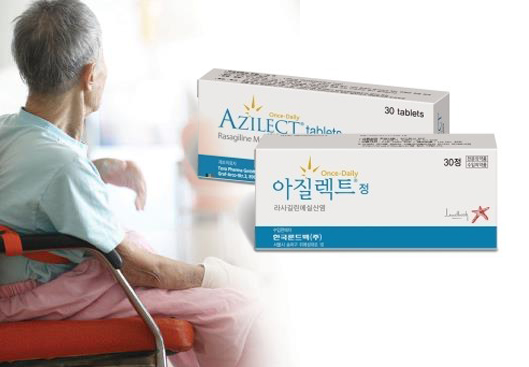Lundbeck Korea’s Azilect (ingredient: rasagiline) is performing well in Korea, becoming the only drug among major treatments for Parkinson’s disease to post a sales growth this year.
According to data from IMS Health, a provider of drug prescription data, Azilect’s accumulated revenue by the third quarter this year went up 36.9 percent to 10.76 billion won ($9.89 million) from 7.86 billion won a year earlier.

Novartis Korea’s Stalebo (ingredient: levodopa), which used to lead the Parkinson’s disease treatment market, saw its accumulated sales drop by 19.7 percent to 11.25 billion won from 13.94 billion won over the cited period. If Stalebo’s sales decline continues, Azilect may beat Stalebo in annual sales and lead the market this year.
Other influential drugs such as Boehringer Ingelheim Korea’s Mirapex (ingredient: pramipexole) and GSK’s Requip (ingredient: ropinirole) also underperformed this year. Mirapex’s accumulated revenue fell by 11.4 percent to 7.61 billion won in the three quarters from 8.59 billion won a year earlier.
Requip PD’s three-quarter accumulated sales stood at 3.92 billion won, and that of Requip, 2.84 billion won. The combined sales of the two drugs were 6.77 billion won, still smaller than that of Mirapex. Compared to the same period of last year, Requip PD and Requip saw their revenues fall by 0.7 percent and 0.8 percent, respectively.
The outperformance of Azilect, developed by Teva and sold by Lundbeck, was widely expected.
After winning approval in 55 countries, including the U.S. and Canada, Azilect arrived in Korea in 2014, with a title that it was a globally popular treatment for numerous patients with Parkinson’s disease. In the local market, the drug drew attention because it was the first new treatment for Parkinson’s disease in 10 years.
The existing Parkinson’s disease treatments had poor or no response to medication in the long-term use, even in a high dose. Azilect was able to overcome such issue, called “motor fluctuations.”
From the launch, Azilect was able to receive insurance benefits on two tracks -- a single use on patients with early-stage Parkinson’s disease and another for a combination with a levodopa-containing drug for patients with motor fluctuations. Such approval conditions helped Azilect positively settle in the local market, observers said.
Within a year and a half after the local launch, Azilect was supplied to the five largest hospitals in Korea.
“Azilect supplemented the weakness of other Parkinson’s disease treatments. Since Azilect, there was no new treatment for Parkinson’s disease either,” an industry executive said. “Unless a new drug comes out, Azilect may lead the market.”

